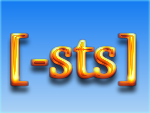Consonant Cluster: /-sts/
 Getting greater articulatory detail in your speech comes from making sure that you include consonant cluster sounds rather than elide them when you feel that the emphasis will serve you. Today we’ll look at a final consonant cluster that frequently gets reduced down to a mere /-s/. These words, in their citation form often end in /-st/, so we’ll focus on words that end in -ist, such as list, but also words with -ist suffixes like aerialist. Because we want the triple cluster /-sts/, we’ll focus on the plurals or verb forms that end with /s/, such as lists, arborists, coexists.
Getting greater articulatory detail in your speech comes from making sure that you include consonant cluster sounds rather than elide them when you feel that the emphasis will serve you. Today we’ll look at a final consonant cluster that frequently gets reduced down to a mere /-s/. These words, in their citation form often end in /-st/, so we’ll focus on words that end in -ist, such as list, but also words with -ist suffixes like aerialist. Because we want the triple cluster /-sts/, we’ll focus on the plurals or verb forms that end with /s/, such as lists, arborists, coexists.
Edith Skinner, in her influential, but controversial book, Speak with Distinction, called the process of speaking this cluster, and ones like it such as /-sps/ and /-sks/, the Swing-Chop action. The idea was that you would lengthen the first /s/, and then quickly “chop off” the plosive-fricative pair so we got [wɪsss-ps, wɪsss-ts, wɪsss-ks ] for wisps, whists, whisks. For some speakers the challenge is that, at speed, they tend to drop off the “chop” portion, and so a word like lists gets pronounced as [lɪsss], where the time that the cluster would normally take gets represented by the elongated /s/.
For your speaking pleasure, I give you a list of /-ɪsts/ words. Speak them slowly at first and then work your way up to speaking them more quickly. The point isn’t to go so fast you begin to fail, but to merely give your articulators a wake up call, a reminder that they can be nimble and agile.
absolutists, absurdists, accompanists, accordionists, acupuncturists, adventurists, aerialists, alarmists, altruists, Americanists, Anabaptists, animal rightists, Antichrists, anti-racists, apologists, arborists, archaeologists, archivists, arsonists, artists, assists, astrochemists, atheists, backlists, balloonists, bassists, bicyclists, biologists, blacklists, botanists, cabbalists, Calvinists, canoeists, capitalists, caricaturists, careerists, cartoonists, cellists, check-lists, chiropodists, Christs, clarinettists, classicists, coexists, collectivists, colonists, columnists, communists, computer scientists, conformists, congregationalists, consists, constructivists, conversationalists, copyists, cosmologists, craniologists, cryptologists.
And, of course, we can’t tackle this cluster without looking at that classic tongue-twister…
Amidst the mists and coldest frosts
With barest wrists and stoutest boasts
He thrusts his fists against the posts
And still insists he sees the ghosts.
[Now I can’t allow a post about /s/-based clusters go by without commenting that there is a bias against high pitched, hissy-/s/, which is often called hypersibilant or just plain sibilant for short. (Sibilant is a term for any /s/-like, hissy sound, but people often misuse it too mean a high pitched, extremely hissy /s/.) Generally, we can assume that you’re working to have a lower, not-too-excessive /s/ that doesn’t draw too much attention to itself.]